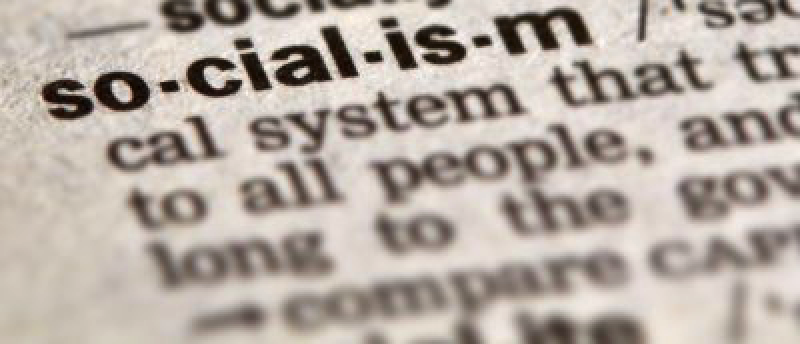What is socialism, and why are some Americans so irrationally opposed to it? It’s because it’s been drummed into our heads since we were impressionable tots that socialism is bad, is dangerous, is a cause of laziness and an entitlement mentality, is antithetical to the American way, is a slippery slope that invariably leads to Communism, that it has failed wherever it’s been tried…
The thing is, we’re not tots anymore. So isn’t it time we considered socialism as adults?
At the root of the word “socialism” is “social,” which refers to people. People socialize with one another, live in a society, attend social events, respect social norms and conventions; and in America, we appreciate having a social safety net, including Social Security. People use social media to connect with family and friends. Being social means you enjoy being around people.
When we use the term “social,” we’re referring to people. And 99% of the time it’s a good thing (a notable exception being the word, “sociopath,” but let’s not go there). It should be no surprise then, that the term “socialism” was coined to describe a people-centered form of government (Of the People, by the People, for the People…) and that it was designed to serve people, not the other way around.
In essence, social-ism = people-ism. So then, what in the world is there to be afraid of?
Words mean things, after all. Most textbook definitions of socialism have no scary connotations or value judgments attached to them. As it should be. Because like capitalism, socialism is a valid model of economic and social organization. Whereas capitalism stresses private ownership and control of assets, socialism is structured around worker ownership/participation and a common, democratic responsibility for assets.
In the U.S., we actually have a hybrid capitalist system that includes many socialist components, some good, some bad. Welfare is one example. When welfare is helping the poor, it’s a good thing. When it’s used to underwrite corporations and pad the pockets of the wealthy, it isn’t.
American capitalism was once an economic engine that generally benefited the masses, but over the past several generations, it has been allowed to become corrupted and co-opted by selfishness and greed. This is why socialism of late is once again being considered by many (especially Millennial voters) to be a more ethical, humane and fair alternative to capitalism. When you have the grotesque degree of wealth and economic disparity we have in Western nations today, it’s easy to understand why increasing numbers of people would feel that way.
Again, neither capitalism or socialism is inherently bad. It’s all about how it’s practiced. Many great countries have opted for a more socialist model, including Great Britain, France, Germany Sweden and Canada. They are all free democracies with solid economies but, unlike the U.S., they place a strong emphasis on the wellbeing of their people, not just their economy.
Ask yourself, then, why would socialism have ever come to be viewed as something bad in the U.S.? The short answer is that some very influential people planted that “seed” early on in the 1900’s and have nurtured its growth ever since.
Who are these influential people and why did they decide to turn “socialism” into a scary, un-American bogey man? Turns out Neoliberals are the “who.” They’re the establishment, the “1%”, the political and economic power brokers in society. And the fact that a government that is of, by and for the people threatens their prosperity is the “why.” At the core, it’s just that simple.
To fully understand Neoliberalism, you’ll want to study your 20th Century history. But in a nutshell, the obscene wealth disparity and unregulated capitalism (sound familiar?) of what was called the Gilded Age of the 1920’s led to the Great Depression, which in turn led to Franklin D. Roosevelt’s sweeping social programs of the 1930’s, which led to a very resentful “ruling class” and their decades-in-the-making scheme called “Neoliberalism” …and the declining situation we find ourselves in today. Don’t worry, you can Google all of this.
To help bring us to the present-day scenario, next up there was McCarthyism, a little thing called the Cold War, and the Space Race, all of which made the USSR (and communism) our sworn enemy. By the time I grew up in the 1960’s, socialism (people-centered government) was erroneously lumped together with communism (government by force), though the one had nothing to do with the other.
Question: Who do you think was responsible for this false conflation of communism with socialism? Answer: It’s the same neoliberals who have been seething since FDR’s social programs that heavily taxed them and their outrageously wealthy friends, and forced the adoption of people-friendly policies in “their” government and businesses. I’d be mad, too, if I happened to be a greedy, self-centered bastard!
No surprise that this is why Neoliberals fear Bernie Sanders’ supporters—because they actually understand the word socialism. And Neoliberalism, too. And because in this socially connected and informed political climate, they might actually succeed where progressives in the past have failed in electing representatives with the peoples’ best interests at heart—and who are determined to right the gross imbalances of today’s off-the-rails, unregulated capitalism.
Am I saying anything that anyone should be afraid of? I would hope the answer is no. Of course, if you’re part of “the 1%,” you probably won’t like some of the necessary changes coming. But for the rest of us 99%—who tacitly enable the ruling class by not holding them accountable—I hope you’ll study up on socialism and have a “Road to Damascus” conversion before the next election.
We need the kinds of structural changes that people like Bernie Sanders are talking about. We simply can’t keep going on this way with a politically compromised and out of control capitalist system. Not only has it displaced our democracy with money that has literally bought our government, it’s actually killing us with decades of unaccounted-for pollution and climate change in exchange for maximum profits for the few. But we aren’t dead yet! Let’s start to turn this around in 2020.




